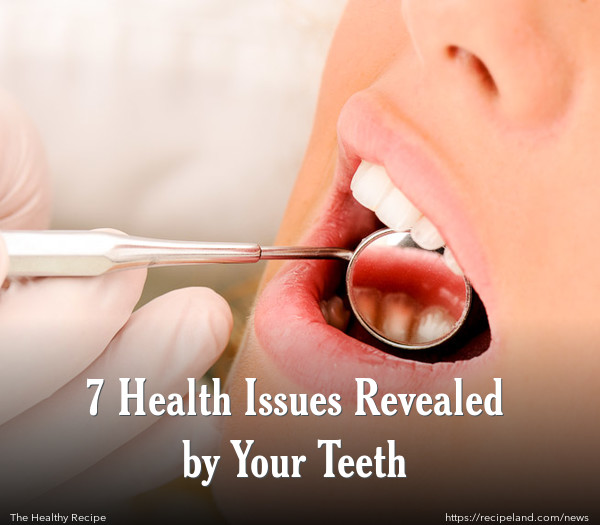There are several health conditions that can be detected just by going to the dentist. Often, symptoms appear in your mouth before anywhere else, which is just another important reason to make sure you are visiting the dentist regularly.
Here are 7 health conditions that your dentist may detect early.
1. Type 2 diabetes
If your gums are red and swollen, or if they bleed, you may have periodontal disease. This is a very common problem that affects nearly half of American adults over the age of 30, and about 70% of those over the age of 65, according to statistics provided by the CDC.
Because periodontal disease is caused by bacteria in the mouth, it will infect healthy gum tissue. Paulo Camargo, DDS, professor of periodontics and associate dean for clinical dental sciences at UCLA School of Dentistry, states, “Diabetes makes periodontal disease worse. Periodontal disease can also make the blood sugar more difficult to control.”
Studies have shown that diabetes is a major issue that affects your risk for periodontitis, which is a severe form of periodontal disease which destroys soft tissues and destroys the supportive bone structure. Those with diabetes are at least three times more likely to develop periodontitis than those without diabetes.
Sally Cram, DDS, a periodontist in Washington, DC, and spokesperson for the American Dental Association, explains, “If gums bleed a lot and are swollen or the patient is having frequent abscesses or infections, the dentist might start to question if you have a family history of diabetes.”
2. Acid reflux
It’s not just garlicky foods or not brushing your teeth regularly that will give you bad breath. In some cases, even with proper brushing and flossing, you may have a chronic case of halitosis, which may indicate certain health problems, including gastroesophageal reflux disease (GERD).
Many times, people do not realize that they even have GERD, but, left untreated, this condition can wear away at your teeth. Research has shown that about a quarter of people with GERD show some tooth erosion, which is easily noticed by your dentist.
3. High-stress levels
If you are under high levels of stress, you may be grinding or clenching your teeth. After a while, this pressure can cause damage to your teeth. Dr. Carmago states, “You can eventually get to the dentin, under the enamel. Your bite height can change and you can create TMJ problems.
There’s also a risk of fracture, you can break teeth.” Stress can also cause canker sores, which are painful. While these sores are generally benign, they can cause a lot of pain, which adds to your stress. If you notice any lesions in your mouth, especially painful ones, and they don’t go away in two weeks, be sure to see your dentist or your doctor because this could be a sign of oral cancer.
4. Low bone mineral density
If you have loose teeth or loose dentures, this could be a sign of low bone mineral density. This is a condition that can lead to osteoporosis. Women with osteoporosis are three times more likely to lose teeth than those without the disease, according to data from the National Institute of Arthritis and Musculoskeletal and Skin Diseases (NIAMS).
Dental x-rays can be used for an osteoporosis screening, since they can be useful for identifying those with osteoporosis instead of normal bone density.
5. Autoimmune diseases
Having a dry mouth can be a side effect of many medications, but it can also be a symptom of autoimmune diseases, particularly Sjogren’s syndrome. This is an autoimmune disorder that primarily affects women over the age of 40, causing dryness in the glands that produce saliva and tears.
This can increase the risk of developing cavities, and your dentist may notice the signs of this condition first and help manage the symptoms, bringing moisture back to your mouth.
6. Eating disorders
Dentists are often the first to detect eating disorders like anorexia or bulimia. With anorexia, the nutritional deficiencies like low calcium, iron, and B vitamins can result in tooth decay, gum disease, canker sores, and dry mouth. Signs of bulimia may include erosion of tooth enamel because of the frequent vomiting of stomach acid.
There may be additional sensitivity to food temperatures, as well as a change in the colour and shape of the teeth. Teeth can actually break when they become eroded enough. Dentists are trained to spot the redness and cuts that can occur on the roof of the mouth as a result of frequent purging, since healthy people rarely have damage to their soft palate.
7. Celiac disease
The National Institutes of Health (NIH) consider dentists to be in a unique position to identify symptoms of celiac disease in patients. Because the condition is an autoimmune disease which allows gluten to cause damage to the small intestine and can lead to significant gastrointestinal symptoms, there could be damage to the teeth as well, including defects in the dental enamel.
The teeth may become discoloured, or show white, yellow, or brown spots. Teeth may also become pitted or banded (a groove may appear across the tooth). The defects may be asymmetrical and are most prominently seen on the incisors or molars. Recurring canker sores, smooth red finish to the tongue, and dry mouth may be other symptoms.
Regular visits to the dentist are not only good for your teeth and oral health, but may also help to identify unusual symptoms of other health problems so that they can be treated more promptly.










Comments